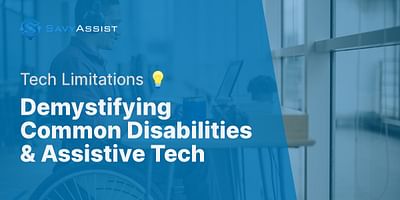Victor is a seasoned UX designer with a focus on crafting accessible interfaces specifically designed for individuals with disabilities. His wide-ranging experience spans across various platforms, including mobile apps and web applications. Victor continually seeks innovative solutions to enhance user experience for all. His dedication to empowering disabled individuals with the latest assistive technology is evident in his work.
Self-advocacy is a powerful concept that can empower individuals with disabilities to assert their rights, make informed decisions, and advocate for their own needs. It involves understanding one's own strengths, limitations, and rights, and actively participating in decision-making processes that affect one's life. In this answer, I will explain what self-advocacy is, why it is important, and how it can empower individuals with disabilities.
Self-advocacy is about taking control of your own life and speaking up for yourself. It means recognizing that you have the right to be treated with respect, dignity, and equality, just like anyone else. Self-advocacy is not about doing everything on your own, but rather about seeking support, making choices, and expressing your needs and preferences.
Self-advocacy is important because it helps individuals with disabilities to become more independent, confident, and engaged in their own lives. It allows them to have a say in decisions that affect their education, employment, healthcare, and overall well-being. By advocating for themselves, individuals with disabilities can challenge stereotypes, break down barriers, and promote inclusivity in society.
So, how can self-advocacy empower individuals with disabilities? Let me break it down for you:
1. Increased self-confidence: Self-advocacy helps individuals with disabilities develop a positive self-image and belief in their own abilities. When they assert their rights and express their needs, they gain confidence in their own voice and become more assertive in navigating the world around them.
2. Improved decision-making: Self-advocacy encourages individuals with disabilities to actively participate in decision-making processes that affect their lives. By understanding their own strengths, limitations, and goals, they can make informed choices and take control of their own destiny.
3. Enhanced communication skills: Self-advocacy requires effective communication skills, such as expressing oneself clearly, actively listening, and negotiating. By honing these skills, individuals with disabilities can effectively communicate their needs, preferences, and concerns to others, including healthcare providers, educators, employers, and policymakers.
4. Access to resources and support: Self-advocacy helps individuals with disabilities identify and access the resources, services, and support they need to thrive. By actively seeking out information, networking with others, and connecting with advocacy organizations, they can tap into a wealth of knowledge and support that can help them overcome challenges and achieve their goals.
5. Empowerment and social change: Self-advocacy is not just about individual empowerment; it also has the potential to bring about broader social change. By speaking up for their rights and challenging discriminatory practices, individuals with disabilities can contribute to a more inclusive and accessible society for everyone.
In conclusion, self-advocacy is a powerful tool that can empower individuals with disabilities to assert their rights, make informed decisions, and advocate for their own needs. By developing self-confidence, improving decision-making skills, enhancing communication abilities, accessing resources and support, and contributing to social change, individuals with disabilities can lead more independent, fulfilling, and inclusive lives.















